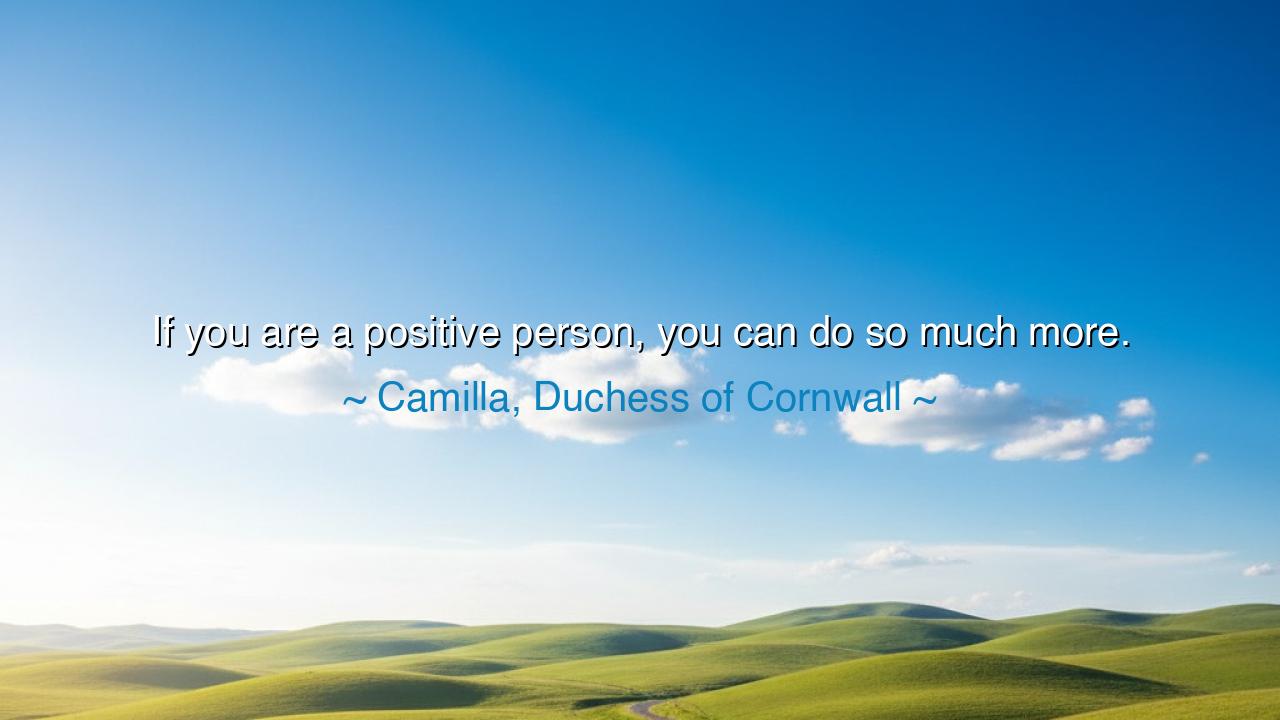
If you are a positive person, you can do so much more.






When Camilla, Duchess of Cornwall, declared, “If you are a positive person, you can do so much more,” she spoke a truth as old as the hills and as enduring as the stars. Her words shine with the wisdom that attitude is not a decoration of the soul, but its very power. A man or woman may be gifted with talent, fortune, or learning, but without the light of positivity, their strength will wither in despair. Yet even the humble, if armed with a positive spirit, can move mountains and achieve what others call impossible.
The ancients knew this secret well. The Stoics, those philosophers of Rome, taught that it is not what befalls us that defines our life, but how we meet it. Positivity is not blind cheerfulness, but the courageous choice to see hope in difficulty, to find opportunity in struggle, to walk forward even when the path is veiled in storm. To be positive is to harness the energy of life itself, to turn obstacles into stepping stones. Thus, Camilla’s words echo the voices of sages long past, reminding us that the spirit is greater than circumstance.
History is rich with living proof. Consider the life of Helen Keller, who, though blind and deaf from childhood, chose to face her fate not with bitterness but with unyielding optimism. Through perseverance and the guidance of her teacher, she became a writer, an orator, and a beacon to millions. If she had surrendered to despair, the world would never have heard her voice. But because she was a positive person, she did not only achieve for herself — she inspired countless others to believe that they too could do more.
Even in the realm of leadership, this truth stands tall. Winston Churchill, during the Second World War, faced a nation trembling beneath the weight of bombings and despair. Yet his spirit remained fiercely positive. His words, filled with defiance and hope, lifted the morale of his people. Though his armies were weary and his cities broken, his positivity became a weapon more powerful than any cannon. Because of it, the British people endured, and from endurance came victory.
Camilla’s words also carry a quiet lesson about the ordinary lives we live each day. Not all of us will lead nations or overcome monumental challenges, yet each of us has tasks to fulfill, burdens to carry, and people to care for. When we approach these duties with positivity, we find energy and creativity flowing more freely. But when we approach them with bitterness, even the smallest task becomes heavy. Thus, positivity multiplies our capacity, while negativity drains it away.
The lesson is clear: guard your heart, for your outlook shapes your destiny. When darkness presses in, choose the light of positivity. When doubts whisper, answer with hope. When failures arise, see in them not endings but beginnings. By doing so, you unlock hidden strength within yourself, and you inspire others to rise alongside you.
In practice, this means cultivating habits of gratitude, speaking words that uplift, and surrounding yourself with companions who radiate light rather than shadows. Begin each day by recalling blessings, and when difficulties arise, ask not “Why me?” but “What can I do through this?” Little by little, this discipline will transform you into a person whose very presence multiplies possibilities.
Therefore, remember Camilla’s wisdom: if you are a positive person, you can do so much more. For positivity is not just an attitude — it is a force, a flame, a wind in your sails. Carry it in your heart, and the journey of life, no matter how rough the seas, will become a voyage of meaning, triumph, and unshakable joy.






MDnguyen minh duc
This quote prompts reflection on the broader impact of mindset. Can fostering positivity in oneself also inspire and empower others, leading to collective achievement? How can leaders and educators use this insight to encourage teams or students to realize their full potential? I’d like a discussion on creating environments where positivity is reinforced and becomes a tool for enhancing individual and collective success.
AOah28 Oanh
Reading this, I think about the psychological and physiological effects of positivity. Does maintaining a positive outlook influence energy levels, focus, or resilience in measurable ways? Are there studies supporting the idea that positive individuals achieve more due to increased motivation and engagement, or is this mostly anecdotal? I’d like a perspective on integrating positive thinking into goal-setting and productivity strategies to maximize outcomes.
NHNgoc Han
This perspective highlights the motivational aspect of being positive. How does positivity impact collaboration, leadership, and problem-solving in professional or personal settings? Could surrounding oneself with positive people amplify the benefits, creating a ripple effect of productivity and creativity? I’d like a perspective on how positivity can be systematically cultivated to enhance performance and satisfaction in daily life.
TTThao Ta
I find this statement intriguing because it suggests that mindset can significantly amplify one’s capabilities. But it raises questions: are there limits to what positivity can achieve, especially in high-pressure or resource-limited environments? Can positive thinking sometimes backfire if it creates overconfidence or underestimation of obstacles? I’d like a discussion on how to leverage positivity effectively while staying grounded and strategic.
GDGold D.dragon
Reading this, I feel inspired but also curious about practical applications. How can someone cultivate a consistently positive mindset in the face of setbacks or failures? Are there techniques or daily habits that help maintain optimism without being naive? I’d like insights into balancing positivity with realism to ensure that it leads to tangible results rather than just feeling good emotionally.